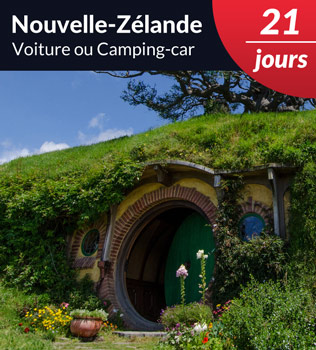
What Are the Safety Instructions?
Please contact us and we will help you to organize your trip! It's free and without commitment.
- Read the post
- Details
- Advices
Presentation.
- 1Should You Be Careful in New Zealand?
- 2What Is the Crime Rate?
- 3What Behaviours Should You Avoid?
- 4What Are the Risks in the Nature?
- 5Surviving the Sun Burns.
- 6Is It Dangerous to Drive in New Zealand?
- 7Should You Be Afraid of Earthquakes?
- 8The Safest Country on Earth?
Should You Be Careful in New Zealand?
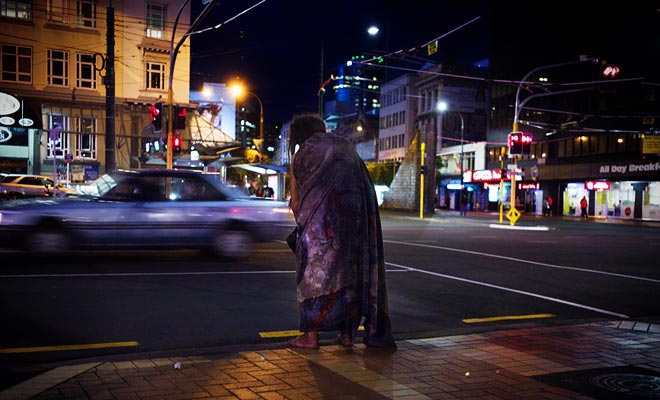
In a country so paradisiacal, poverty still exists!
New Zealand has a very positive image among the general public, but criminality exists there like everywhere else in the world. The question is whether or not you will have to face it during your trip.
Security concerns are usually overflown in travel guidebooks. Yet it is for the sake of travellers to be informed about the dangers they might face. On Kiwipal we are not trying to minimize problems, neither to embellish reality. The criminality is discussed without taboos, as well as the dangers of driving on the left or the problems that may occur during a mountain hike.
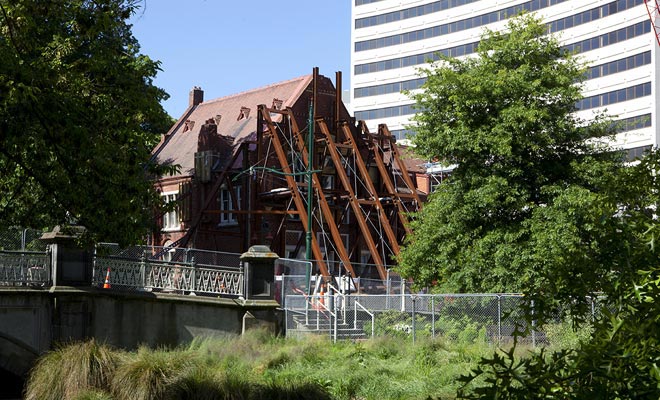
Christchurch is recovering from the great earthquake.
Should you fear a replica of the Christchurch earthquake?
This is a frequently asked question on Kiwipal and it deserves to be discussed with transparency. I will review the risks to experience an earthquake during your trip in New Zealand.
These are good reasons to seriously read this article if you're planning a trip to New Zealand.
You'll find a comprehensive guide on security, without jargon, with practical tips to solve any problem.
What Is the Crime Rate?
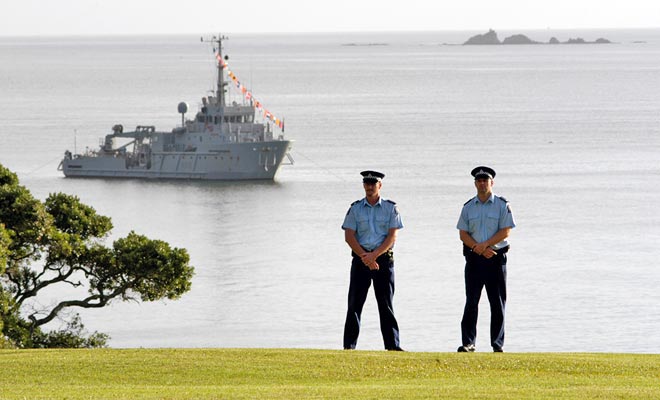
Being a foreigner does not protect you from fines.
New Zealand has a crime rate among the lowest in the world. Statistically rising during the 90s, it declined strongly in the early 2000 to regain its level of the 80s.
The country communicates ethnic statistics and there is a strong controversy regarding the Maori population. One can argue about the validity of the process, but this ethnic group seems to be statistically more represented in crime rates.
Some people consider that statistics reflect the poverty that affects the Maori community. Other people will consider that the problems are more related to the Western colonization heritage.
A debate that may sound familiar to some, but no foreigner can fully understand it nor have a serious opinion without knowing the History of the country.
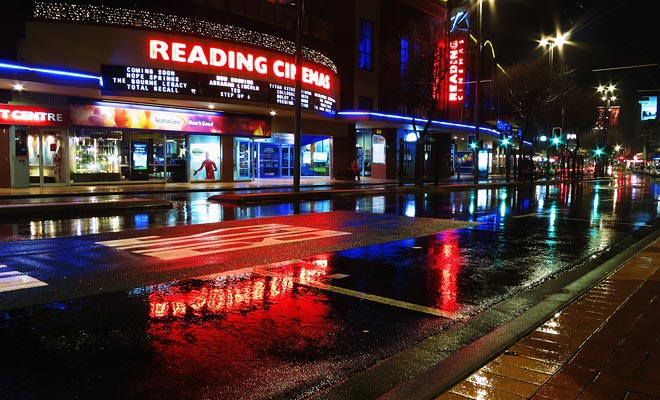
In the evening, the same precautions must be taken as in Europe.
If the criminality is more pronounced in the Maori community, it affects only a minority of its population. There is no reason to fear the Maoris who are like the other kiwis: adorable people, warm and welcoming.
Obviously, itineraries we suggest on Kiwipal does not include visits of poor neighbourhoods where gangs exist. In the main tourist areas, it is mostly theft that is to be feared and not physical aggression which are quite rare.
Although the risks are very low, I will address the issue of social behaviours to avoid.
What Behaviours Should You Avoid?
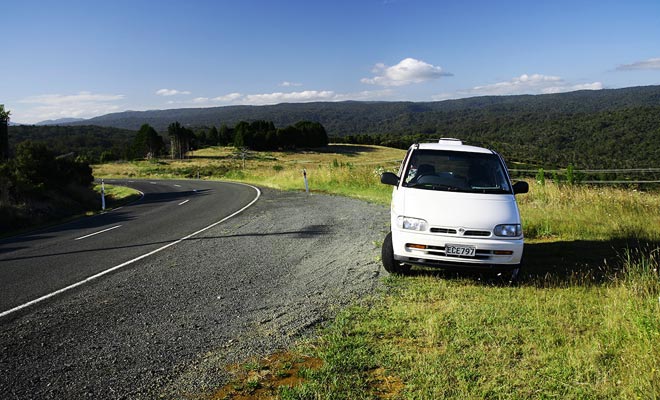
Thieves mainly target isolated vehicles in the wilderness.
In New Zealand like anywhere else, some behaviours can get you into trouble or increase your chances to be the victim of a thief.
The territory covers an area roughly the size of the UK, but with a density 16 times lower per square kilometre.
You should avoid leaving your belongings inside the vehicle, even if you're abandoning it for a few minutes only.
Use your common sense, especially in low traffic residential areas. If you come home late in the evening, just make sure to ignore the drunk people (often just students). Ignore their calls, provocations and proposals and move on.
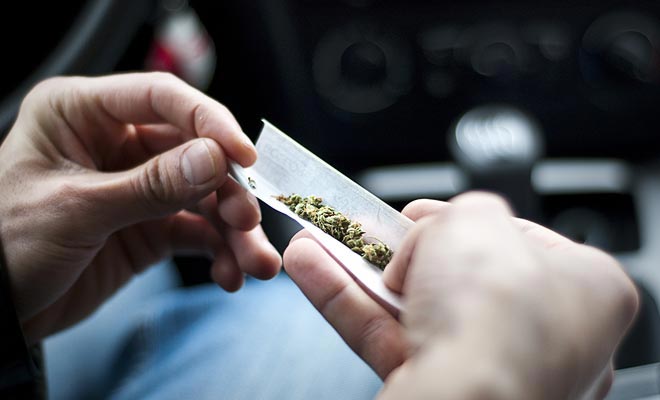
Marijuana is easy to find but can cause you to be expelled.
Cannabis has a reputation of being easy to find in New Zealand, but the police apply a zero tolerance.
Being arrested in possession of drugs, regardless of the quantity, implies the end of the holidays, a severe fine and the immediate return to the origin country.
A woman traveling alone is not bothered more than a man, but do not be too confident.
Watch your glass in bars and call a taxi if your hotel is not in a busy area.
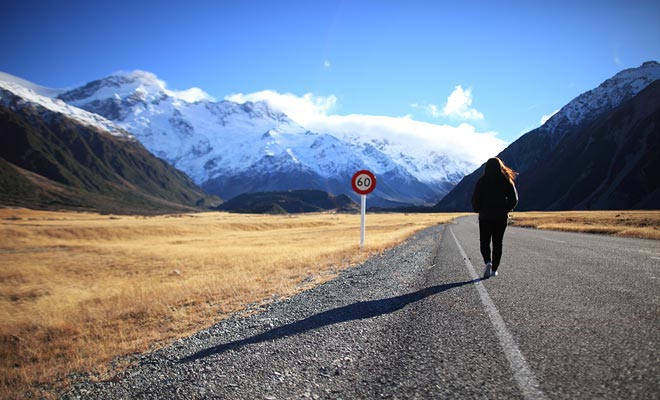
Hitchhiking is not dangerous but caution is required.
It is easy to drop your guard when you feel confident.
And the legendary kindness of the Kiwis gives the impression that the thefts and aggression do not exist in this country. If you adopt the same level of prudence to what you are used to in your origin country, then everything should be fine.
Security is not only related to the crime rate: wild nature also possesses its own dangers..
What Are the Risks in the Nature?
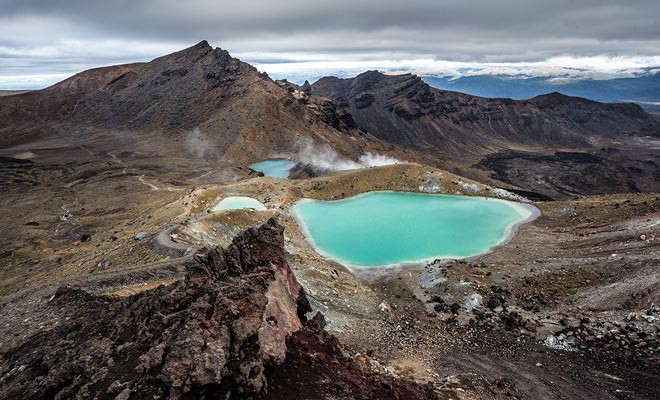
Even though it is clear, water is not drinkable in nature.
New Zealand does not present any major risk, from a health perspective. No vaccination is required to enter the territory (to check, however, with your embassy), but it does not mean that wild nature is absolutely safe for tourists.
You must not drink the water from rivers even when it seems pure. There is a parasite (Giardia), which gives nausea and diarrhea. Campers should boil water before drinking, and if you have no experience in this field, please do not try to light a fire in the forest!
A bad fall can have serious consequences if you hike in the wilderness. The Outdoor Intention website is provided for this purpose. You indicate your itinerary and an alert will be triggered automatically if you do not report your safe return.

Do not go hiking without signaling your intentions.
The weather and temperatures can change suddenly in New Zealand. A large blue sky can give way to a storm in less than a half hour. If you are unprepared, you may risk hypothermia in the mountains. There are basic rules you should always follow. An improper or incomplete equipment is at the origin of most problems. Forgetting to pick bottled water, wearing inappropriate footwear or walking off the path are the classic errors identified by rescuers.
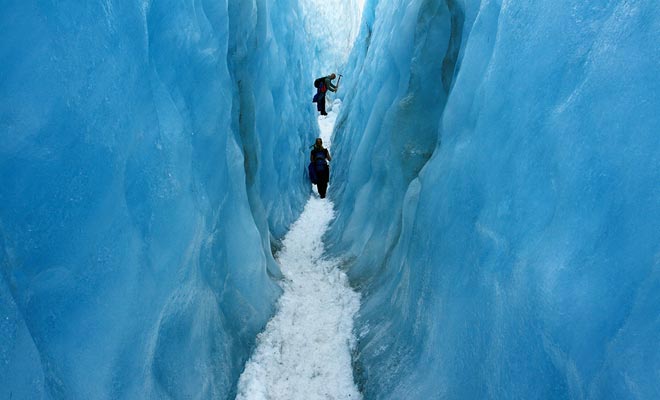
The exploration of a glacier requires the presence of a guide.
New Zealand has excellent health services and modern hospitals. But one needs to be able to call for help in case of accident. Do not forget your cell phone and the list of emergency numbers , especially if you travel in isolated areas. Any health problems should lead to a visit at the doctor. Rabies is still carried by animals, so do not hesitate even in case of a slight bite. As for the bites of the Milford Sound's sandflies that can spoil your vacation, a simple repellent will keep these midges away, provided you remember to use it before getting outside!
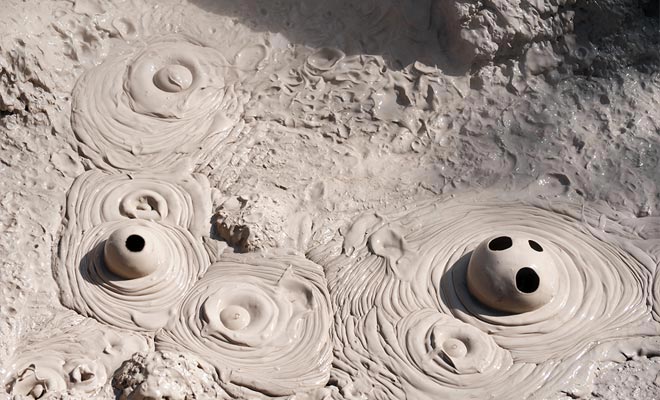
Beware of the temperature of geothermal zones.
In a geothermal area such as Rotorua, you must observe the safety instructions even if the place seems safe at first sight.
Do not go put yourself in danger just to take a single photo. Volcanic activity is subject to constant monitoring, in particular in the Tongariro National Park or White Island.
Unlike earthquakes that strike without warning, the coming eruptions are usually detected in advance. This is why you should contact an iSite first if you plan a hike in a volcanic area.
Surviving the Sun Burns.
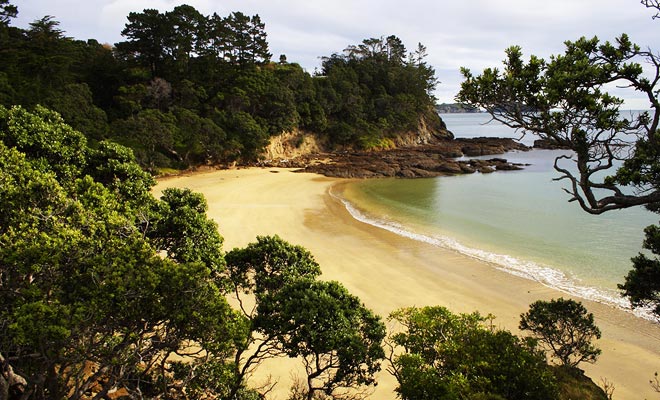
The ozone layer is weaker than you think!
New Zealand is located right under the hole in the ozone layer. Ironically, the purity of the air contributes to let pass even more ultraviolet rays!
This means that the sunscreen is essential and that you must choose a higher protection index than usual.
You should buy at least an index 30 and a full sunscreen for children. I know that it is difficult to ask vacationers not to expose themselves to the sun between 10am and 4pm, but if you have to, please do not forget your sunscreen!
With hundreds of kilometers of deserted beaches, New Zealand is reminiscent of the lost paradise. However, the beautiful beaches are not without of danger! When in doubt, it is better not to swim because the currents can be dangerous.
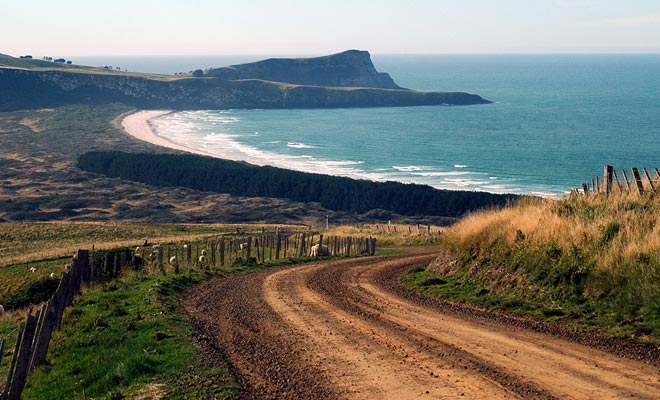
Do not bathe if the beach is not monitored.
Some beaches like Hot Water Beach possess areas closed to swimming. The presence of people on the beach or in the water does not necessarily mean an absence of danger. Do not follow other people blindly.
Sea water is often pretty fresh in New Zealand. Only the sunny days of summer are perfect for swimming without a combination. Do not risk an hydrocution and take your time to get into the water.
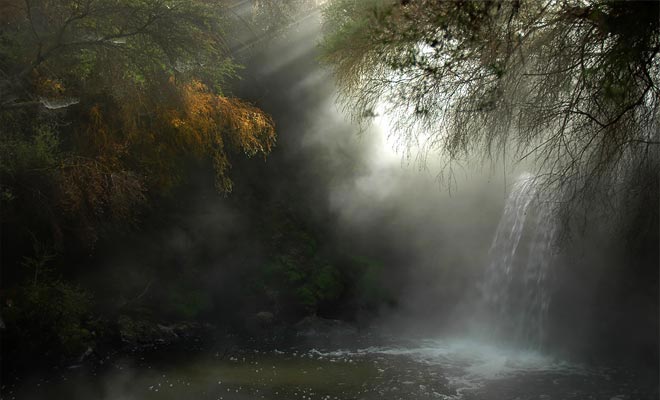
Do not put your head under water in the hot springs.
The thermal springs allow to swim all year long at the sole condition not to put your head under water. Although rare, the amoebic meningitis is an amoeba that enters the body through the nose and can be fatal for man.
Is It Dangerous to Drive in New Zealand?
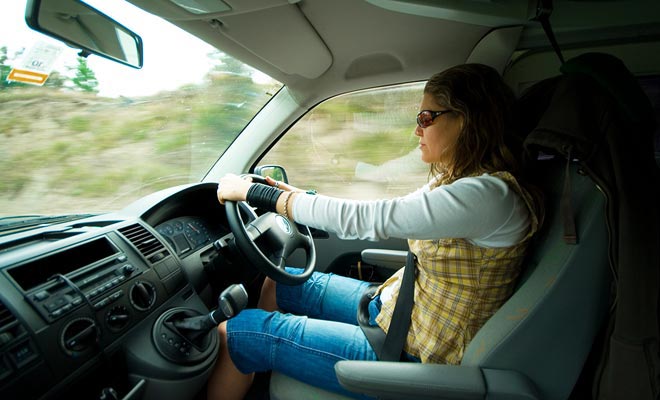
Driving on the left may require more vigilance.
Sitting in a vehicle with a steering wheel on the right is highly confusing if you come from a country where people drive on the opposite side of the road. Fortunately, if we drive on the left in New Zealand, the priority rule is preserved on the right.
The maximum speed is limited to 100 km / h on the speed highways of New Zealand. Driving more slowly than usual is no big deal... But New Zealanders, usually so nice with strangers can become quite stressful and annoying for other drivers when they hit the road.
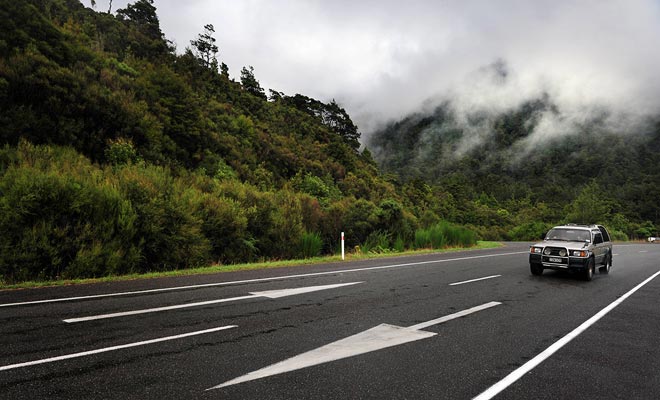
On deserted roads, the speed limits are easily forgotten.
Familiarise yourself with your vehicle before getting into the circulation (limited to 50 km / h in town). You can drive around a car park or the neighbourhood to get used to the idea of driving on the left. It is often said that it requires two people to create an accident, so be careful and do not forget to put your car blinking lights. Excessive speed, besides the fact that it is often captured by radar, is easier to achieve because many people are used to drive faster in their own country! On the other side, the landscape is magnificent enough to grab full attention, and some tourists may slow down suddenly, without warning the other drivers.
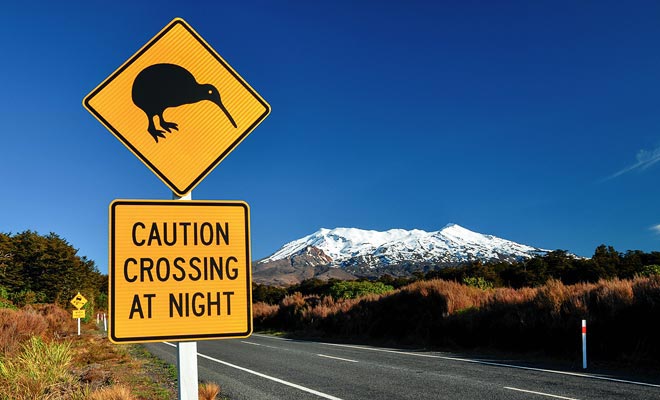
Drive carefully to avoid hurting animals!
If you must stop to admire the scenery, please do not slow down suddenly but progressively and park in a safe place. Get off your vehicle and stay away from the road. If you are pursuing the journey by bicycle, keep in mind that New Zealanders do not respect safety distances most of the time.
The driving Code is similar to the international code, but it has small nuances. The surprise usually comes from the post signs that are not where a foreigner may expect them to be.
For example, the sign posts are sometimes planted on the opposite side of the intersections (which is not the case in France for example). The zebra lines separating two traffic directions are being used to turn on the right, while it is usually strictly forbidden to do so in Europe.
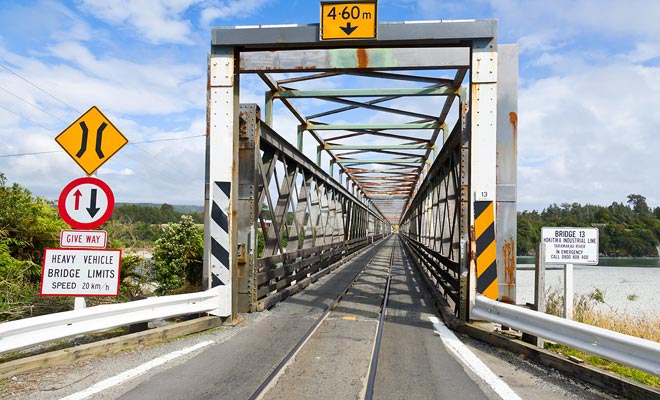
Narrow bridges are sometimes borrowed in both directions.
Bridges with a single lane are sometimes notified at the last minute on the road. But the ultimate surprise comes with the cattle wandering quietly on the road. This is usually when someone begins to feel comfortable to drive on the left side of the road that the risk increases. Stay focused all the time but relaxed and everything will be fine. Now, we still have to discuss another important security problem.
Should You Be Afraid of Earthquakes?
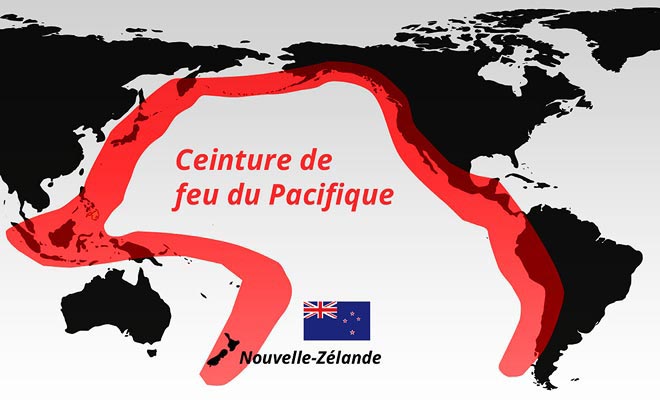
Volcanic activity and earthquakes exist in the country.
New Zealand is located on the great Pacific Ring of Fire. This is a volcanic land often shaken by earthquakes.
With 15,000 earthquakes per year (most too weak to be even noticed), there is very little chance that you are a victim of a serious seism. Earthquakes hit mostly the North Island, but the buildings there are designed to resist.
Can the tragedy of Christchurch happen again?
According to seismologists, the chances are less than 1% annually. A very low level, but the possibility exists after all.
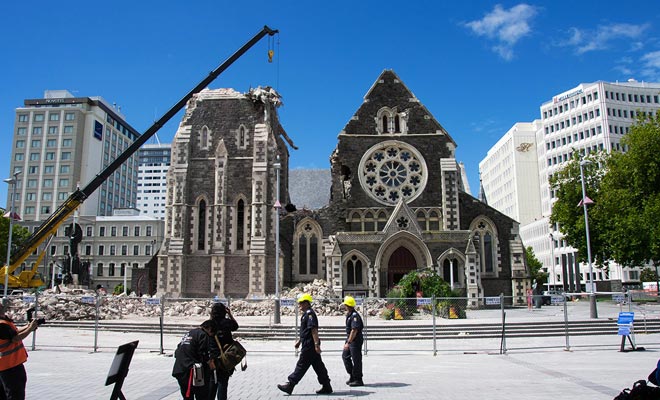
The great earthquakes are fortunately rare.
Other cities have experienced strong earthquakes in the past without enduring such massive destruction.
The attitude to adopt depends of the earthquake strength. A small seism only lasts a few seconds and is harmless (the majority of the earthquakes in New Zealand can be classified in this category).
However, the strongest earthquakes can last during several minutes and they are quite frightening.
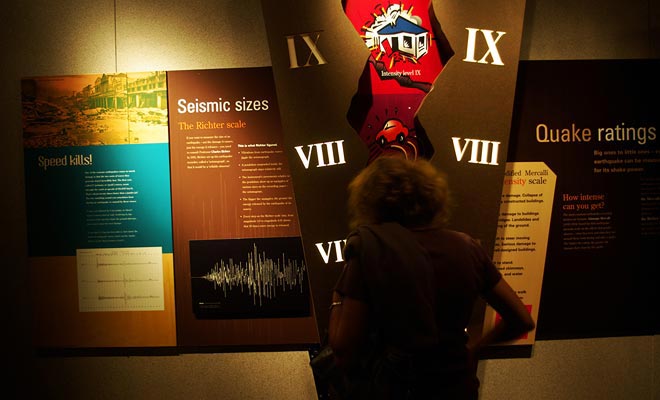
Part of the museum is devoted to earthquakes.
The behavior to adopt is not the same whether you are inside or outside a vehicle, for example. Honestly, I can't summarize such an important subject with few basic tricks. While awaiting a dedicated article on Kiwipal, I invite you to consult this handy guide to learn how to respond effectively in case of an earthquake.
The Safest Country on Earth?
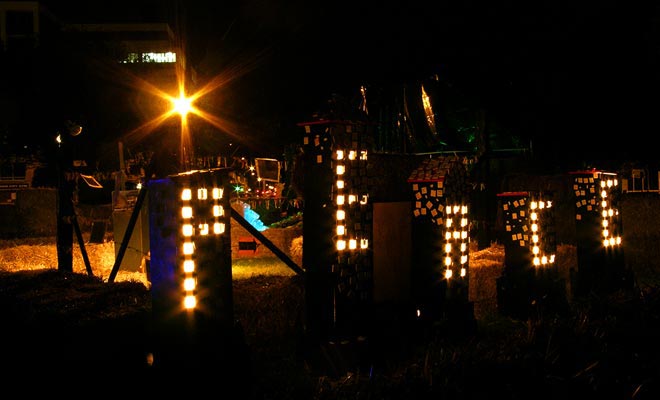
New Zealand has very low crime rates.
Of course, security issues have to be considered when traveling in an unknown country on the opposite side of the globe. However, one must not be afraid of New Zealand, a modern country with the friendliest people on earth.
Community tensions are much less marked than anywhere in the world. Auckland is now classified at the second position of the most pleasant cities in the world. The country is far enough not to feel international tensions, even if its economy depends largely on the international market.
The last terrorist act in New Zealand was done by the French secret services. Some Kiwis do not lose an occasion to remember the Rainbow Warrior. case when they meet French people. So, if you are French, do not take offense and turn the conversation to their last victory in the World Cup.
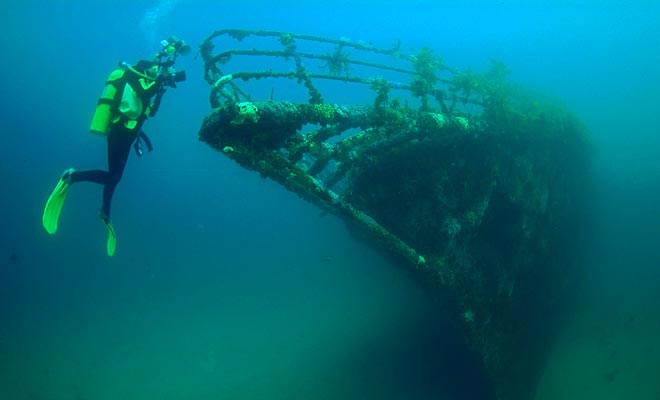
The memory of the Rainbow Warrior is still alive.
In my opinion, the real danger is on the road. The absence of circulation and the scenic beauty should not make you forget to watch the road constantly. Adopt a responsible attitude in all circumstances!
You're not safe from injury when you go hiking. I insist on the need for proper equipment. Do not try to keep pace with other walkers stronger than you (it's not a race!), and take time to study your itinerary.
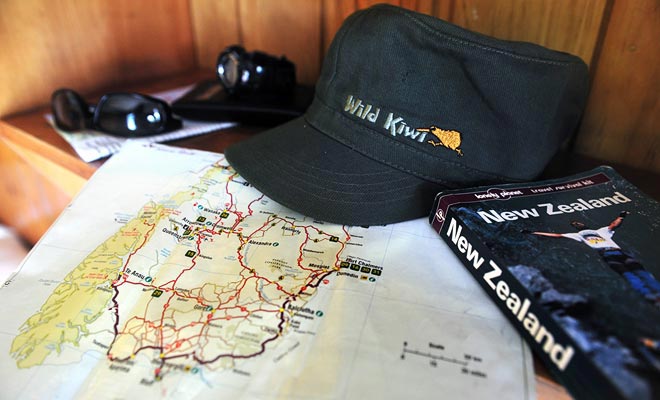
Planning the itinerary is essential.
New Zealand is a country where a victim can be sure that his complaint will be considered by the police. In comparison, countries like France ranks at the 10th place on the same criteria. This to say that if you adopt the same security reflexes as usual, there is no reason for you to be in trouble. Thanks for having read this article seriously. And do not forget to travel with a good insurance!


Questions & Answers.

What can I do for you? We should be able to talk about safety issues frankly. Ask me your questions, I'll do my best to answer.
- All topics ... 14 answers in total
- Crimes and Offenses 5 answers
- Dangers in Nature 5 answers
- Road Hazards 2 answers
- Earthquakes 2 answers
Crimes and Offenses
- Is crime rate lower than in Europe?
The current crime rate of New Zealand is so low that the country is now ranked among the least dangerous in the world.
- What crimes do tourists suffer the most?
These are mainly car stealing, most often when you leave your car parked in a desert place lost in the wilderness.
- Can we practice hitchhiking?
Hitchhiking is not a dangerous activity, but I recommend practicing it with a companion and to avoid isolated areas.
- Can a woman travel alone?
New Zealand is not a dangerous country for a woman traveling alone, but bad encounters are always possible. If you are traveling alone, avoid camping and prefer youth hostels.
- Is cannabis use permitted?
Consumption just like the simple detention entails the expulsion of territory, irrespective of the quantity of substance found at arrest. The culprit will not be able to return to New Zealand before long.
Dangers in Nature
- Can we drink water from rivers?
You must absolutely boil the water of the rivers or filter it before drinking it. There are water filters for sale in good sports shops.
- Can you swim in the hot springs?
Do not bathe unless a sign permits it, because some hot pools can become burning without warning. In all cases, avoid putting your head under water, there are risks of developing meningitis.
- How to signal your outdoor intentions?
The Outdoor Intention site is specially designed for this purpose. You indicate your itinerary and rescuers will be dispatched if you are not back in time. Make sure you have access to the Internet on your return so as not to trigger the rescuers for anything (otherwise you will pay the bill).Outdoor intentions
- Why should sunscreen be used?
Even if the sky is slightly overcast, you can catch sunburn. The ozone layer thinner than in Europe filters less ultraviolet rays.
- Can we swim on a deserted beach?
If you are alone or only a few people on a beach, it is not advisable to bathe. Some strong currents are present even at a short distance offshore.
Road Hazards
- What is the main danger of driving on the left?
To drive left if you are not used to it, you will have to change habits or reflexes acquired for years. A classic mistake is to be less focused when the road is deserted and when you are back on the road after a break.
- Why should one be careful on a deserted road?
On a totally deserted road, one tends to lower his guard after a long period without seeing anyone on the road. If you want to admire the scenery, take the time to stop for a real break and do not stay on the road.
Earthquakes
- What are the chances to attend an earthquake?
The chances of an earthquake during your stay are low. If this happens anyway, it will undoubtedly be a very small shake without gravity: serious earthquakes are rare.
- Should we avoid going to Christchurch?
The risks of a severe earthquake in Christchurch are 1% each year. In these conditions, there is no need to worry especially if you have a single night on the spot like the majority of tourists (which means you have 0.0002% of chance of being present during a severe earthquake each year ).



